This is the third instalment in our series of photographs and stories about Bhopali children by photographer and author Rohit Jain. This week we have the stories of Nida, Ayushi and Naveeda, all of whom were receiving regular treatment at the Chingari clinic before lockdown. Rohit visited them during lockdown to speak with them and their families about their experiences. Thank you to Rohit for the incredible pictures, and to all the children and their families for agreeing to share their stories with us.
All photographs by Rohit Jain.
Nida
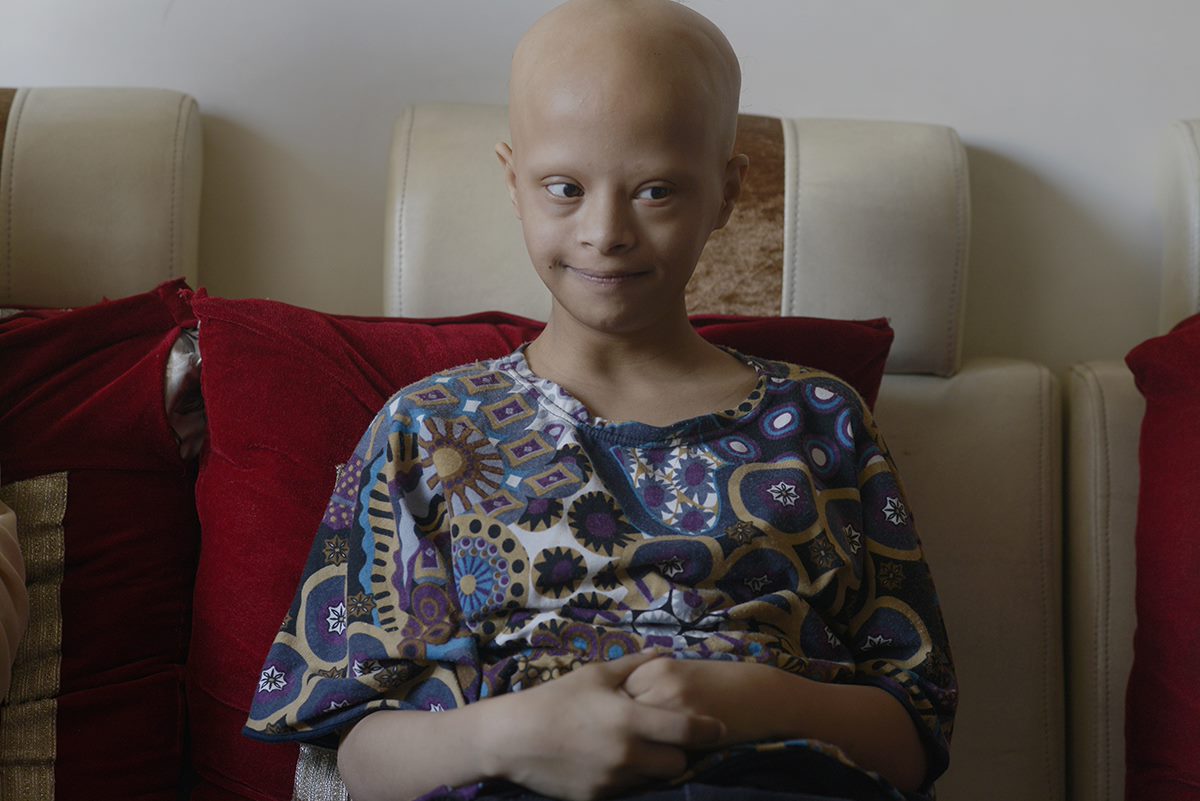
12-year-old Nida Khan has Downs Syndrome with Alopecia.
When she was 7 years old, Nida’s mother was exposed to the poisonous MIC gas leak from the Union Carbide factory. Although the gas burnt her eyes and choked her lungs, she did not appear to suffer any long-term damage. But her mother, Nida’s maternal grandmother, was badly affected and admitted to the hospital for a week. She died from health complications resulting from exposure less than a year later, Nida’s mother told me. Nida’s paternal grandparents, who lived less than two kilometres from the factory site, were also exposed to the gas. They have a TISS survey card, one of the government-issued documents that prove someone was exposed to the gas.
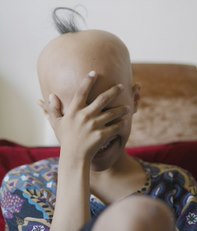 Downs syndrome is a condition where a child is born with an extra copy of their 21st chromosome. This causes developmental delays and sometimes accompanying physical impairments.
Downs syndrome is a condition where a child is born with an extra copy of their 21st chromosome. This causes developmental delays and sometimes accompanying physical impairments.
Nida got a scratch on her knees. She was showing it to all of us. Her ‘khala’ (mother’s sister) laughed and told us ‘she will show it to everyone now’. Nida also laughed with her. She is close to her Khala. She plays with her and fights with her. Nida misses her hair. When she sees her aunt and her 7 year old sister Shehrish combing their hair she has them put their hair over her head, then comb it out like she has a pony tail. She feels sad about it; her mother consoles her and says “तुम्हारे बाल आ जायेंगे बेटे” (“maybe your hair will grow in time”). Her mother told me, “she knows that she has lost her hair permanently and she feels disappointed over it”. Nida overheard our conversation about her hair and reacted in disappointment.
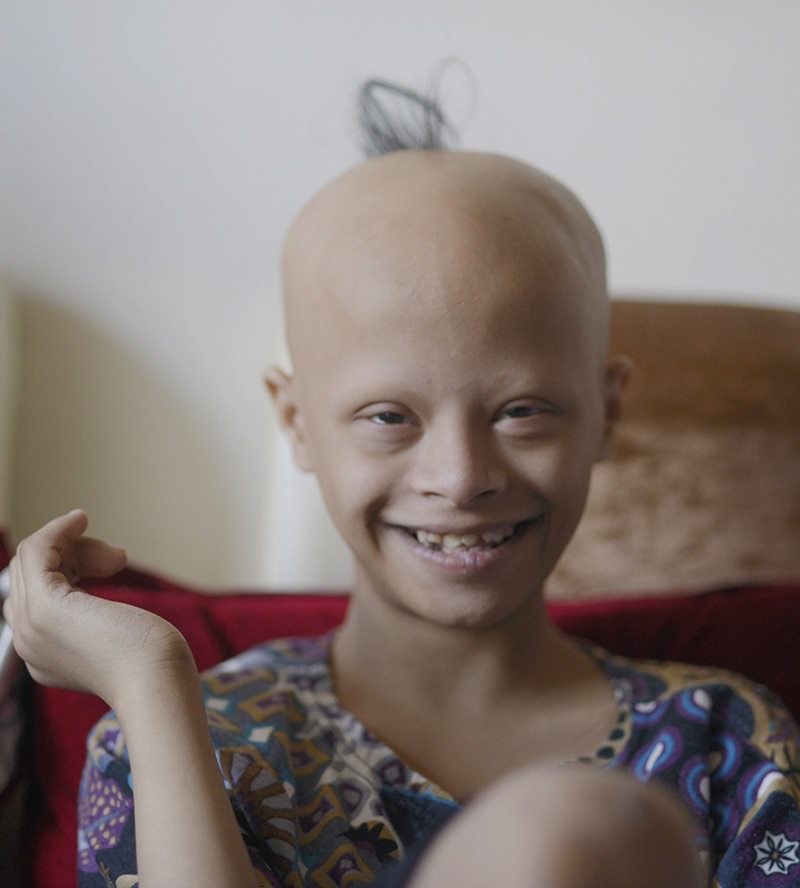
Nida spends most of the time with her cousin Zaid. “She plays with my tummy and watches web series with me”, Zaid tells me. Nida’s favourite movie is Chennai Express. She loves to dress up in her favourite clothes. She featches the clothes from her wardrobe and picks the outfit she wants to wear. She then carefully folds her other clothes and puts them back in the wardrobe. Her mother appreciates the way she cares for her clothes. Her mother says she likes to wear shorts and t-shirts or sporty dresses, but not traditional clothing like the salwar kurta. If she is dressed in a salwar kurta she becomes frustrated and wants to change.
Since the covid-19 lockdown, her regular therapy has been affected. She has started struggling with her speech and her writing again, both of which had improved with regular therapy. She has also become less physically active, her mother tells me, but otherwise she is still physically well.
Four months ago, Nida’s father passed away due to heart failure. Nida does not fully understand and her family have not been able to explain to her. They are afraid of how she will react if she knows, as her father adored her and loved spending time with her. However, her mother and aunt tell me she has understood that her father will never come home again. Sometimes, she looks out the window and says “Abbu hain wahan” (“father is standing there”).
Nida needs love, good company and encouragement.
Ayushi
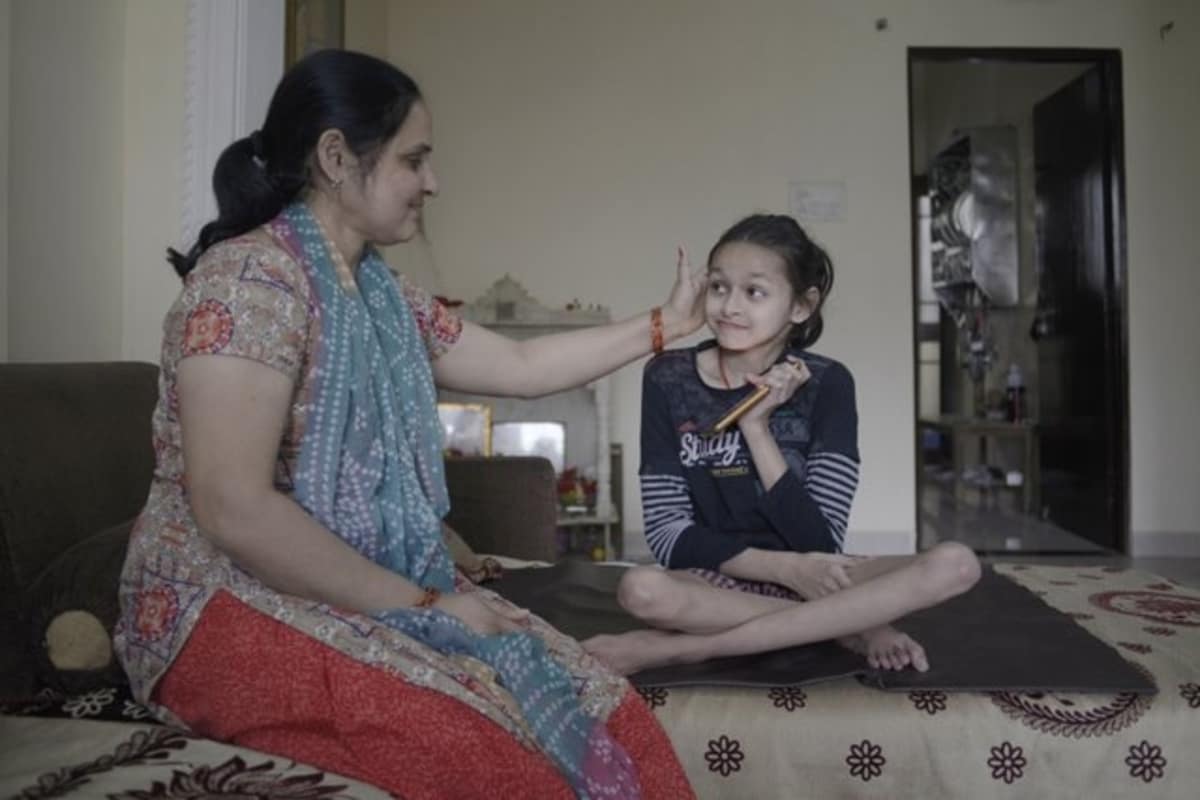
12-year-old Ayushi has has cerebral palsy.
Ayushi’s mother kisses her on the forehead and says “my daughter needs lots of love, just love”. She hugs Ayushi tightly. Ayushi also rubs her cheeks to her mother’s. She is so happy in this moment. When she is happy or excited her hands shake involuntarily.
Often, Ayushi also bites her hands when she is too excited or angry. Her self-biting has increased since her regular therapy was interrupted due to the Covid-19 lockdown. Her mother, Jyoti, says “Yashi (Ayushi’s nickname) needs only two things; continuous love and regular therapy. It helps her to thrive better.” Before the lockdown, with the help of regular therapy she had learnt to sit better, had learned to signal when she is hungry by putting a finger to her lips, and was able to hold on until either of her parents were able to take her to the washroom.
In 1984, her mother Jyoti was 5 years old when she was exposed to the MIC gas leak from Union carbide’s pesticide plant. She had just arrived in Bhopal by train with her father, pregnant mother and siblings, when clouds of toxic gas filled the air. Her brother’s child also has medical complications like Ayushi. While there could be other reasons for Ayushi and her cousin’s medical conditions, research shows that exposure to MIC gas can affect the genetics and cause complications during pregnancy and potential birth defects.
Ayushi is her parent’s world. Her parents avoid leaving the house for fear that the virus could be dangerous for Ayushi, and are avoiding all travel. As Ayushi grows, it is becoming difficult for her parents to carry her in their laps. Previously, when they had left the city to travel for work, they had friends and relatives who would care for Ayushi, but that is no longer possible. Ayushi has an elder brother who plays with her regularly, but he is not yet able to care for her as her mother does.
Ayushi listens to songs on her mobile. She dances by moving her hands. When her father was talking about her interest in music, she got very happy and excited. Her father explained how therapy has helped her thrive better: “earlier, Ayushi used to have frequent Urinary Tract Infections and rashes because of wet diapers. Now it’s better.”
Ayushi feels uncomfortable and sometimes irritable in crowded places, but when she was allowed she liked to go out. Her father takes her with him on his bike.
Her mother Jyoti tells me “we love our daughter as she is. We love to take care of her”. She has tears in her eyes.
Naveeda
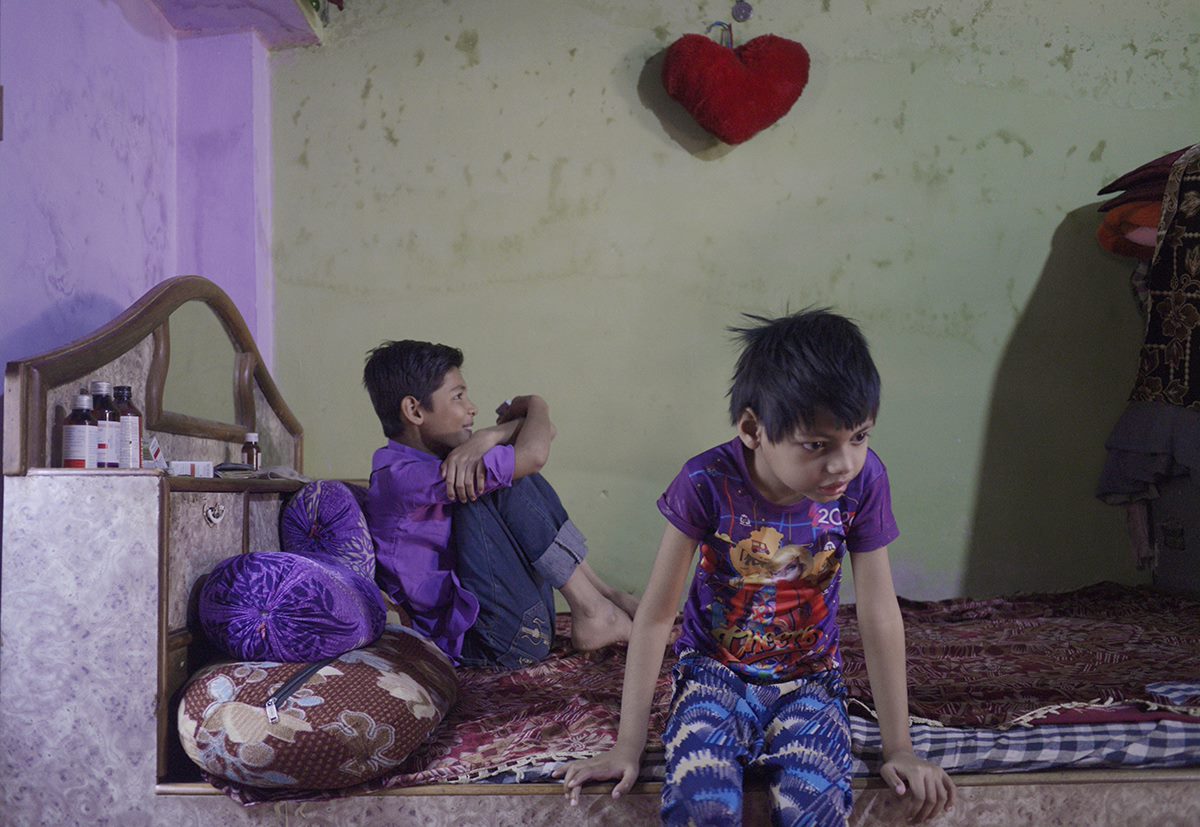
8-year-old Naveeda has autism.
Her mother was sobbing as she told me “my daughter doesn’t recognize me, her father and siblings. She looks lost.”
Naveeda’s mother was exposed to toxic gas during the gas disaster of 1984. She was just an infant at the time of the tragedy so doesn’t even remember, but her parents told her that they took her in their arms and ran away from the clouds of gas during the night. Recent studies of the soil around the plant reveal that Naveeda’s parents have also been consuming contaminated groundwater for years. Union Carbide used to release its chemical waste into a nearby pond, which seeped in to the ground and poisoned the water supply.
Many of Naveeda’s relatives are uncomfortable with her condition and keep their distance from her. They keep her dishes separate or don’t touch her dishes until they’ve been washed. Her mother feels bad about it. Sometimes, they call Naveeda ‘paagal’ (‘deranged’). Naveeda’s mother defends her and sometimes has arguments over this with her relatives. She has mostly stopped visiting her relative now because of their attitude to Naveeda.
While Naveeda doesn’t interact with her siblings, she likes to lie down near her them while they watch TV or study. Every night, she sleeps holding her elder sister Gulbasha, but it still appears as if she doesn’t know who she is, her mother tells me.
If the outside gate is left open, Naveeda has a tendency to go to the front door of the house and peep outside. Sometimes, she even ventures out. Because of this, her mother keeps the door of the house locked during the pandemic. She tells me that Naveeda is able to recognise some specific things in her house, like the bathroom, stairs, kitchen, etc.
“Since she is having regular therapy, she asks for food. When she is hungry, she goes in the kitchen and shakes her legs. When she wants to go to toilet she sits outside the washroom and wait for her mother, unlike before. Therapy has helped her thrive better. Earlier, she used to get angry and bite anyone but she is managing well now”, her mother says.
However, since the lockdown her regular therapy has been disrupted. Sometimes she becomes hyperactive and wobbles when she stands, at other times she appears lost and passive. Recently, she has started having frequent seizures, but the exact reason for the seizures hasn’t been discovered yet. She has stopped calling the only two words she knows – ‘Ammi’ and ‘Abbu’ (‘mum’ and ‘dad’).
Sometimes, Naveeda stops eating for days. It mostly happens when her medicines are changed. Her mother is forced to take her on her lap and feed her.
Naveeda’s mother asks “what is the future of my daughter? Till we are alive we can take care of her but what after that?” She has tears in her eyes. “Her father also loves her so much. He would take her on bike ride. He would even get angry on me if I delay in feeding Naveeda. This causes us to fight.” She smiles at me through her tears.


